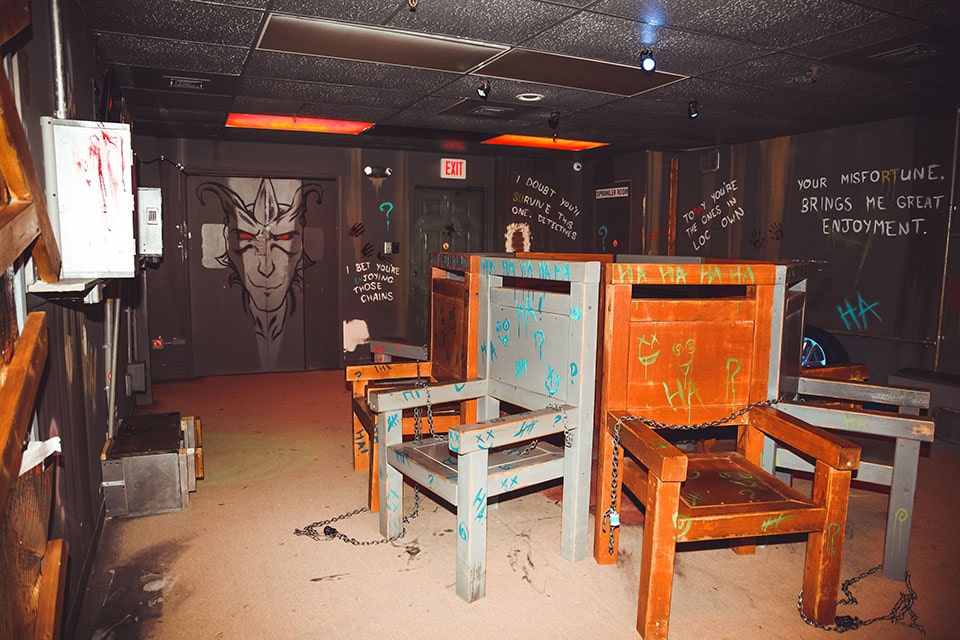Best Escape Room Experience-- Exciting Gamings and Puzzles for Teams
Best Escape Room Experience-- Exciting Gamings and Puzzles for Teams
Blog Article
Group Approaches: Exactly How to Work together Efficiently in a Retreat Room
Browsing the intricacies of a retreat space necessitates more than simple enthusiasm; it requires a well-coordinated strategy grounded in clear interaction, calculated role tasks, and skilled time management. Teams need to actively pay attention to every member's insights, designate roles that line up with individual toughness, and preserve regular check-ins to ensure emphasis and avoid redundancy. By cultivating an atmosphere that values communication and adaptability, groups can significantly heighten their performance and success rates. The subtleties of these techniques can change the experience, but how exactly can they be applied to optimize the potential for success?
Establish Clear Communication

To promote clear interaction, it is vital to mark a central factor of get in touch with for information circulation. This role entails summarizing searchings for and proposed approaches to guarantee every person continues to be on the same page. In addition, taking on a methodical approach to conversations can protect against chaotic exchanges. For instance, quick, focused updates from each employee can keep the group educated without overwhelming them with info.

Designate Roles Purposefully
While clear communication establishes the foundation for efficient team effort, assigning duties tactically makes certain that each staff member's strengths are used properly. In a getaway space scenario, the time-sensitive and complicated nature of challenges requires a well-organized approach to task delegation. By recognizing and leveraging individual expertises, teams can enhance their analytic abilities and boost general efficiency.
First, examine the distinct abilities and qualities of each individual. As an example, a person with a keen eye for information may excel in locating covert things, while a logical thinker might be better fit to addressing puzzles - best escape room. It's equally essential to have a leader who can manage progression, manage the timeline, and make decisive telephone calls when needed. This duty often needs solid business and social abilities.
Second, ensure that roles are versatile and versatile. As brand-new difficulties emerge, the team has to have the ability to pivot, reapportioning jobs as needed. This flexibility aids keep momentum and stops bottlenecks that could occur due to stiff function tasks.
Ultimately, a critical strategy to duty assignment not just takes full advantage of the toughness of each employee yet additionally promotes a cohesive environment, driving the group in the direction of a successful getaway.
Use Diverse Skills
Recognizing and using the diverse abilities within your team can dramatically elevate your performance in an escape room. Each employee brings unique staminas to the table, and effectively leveraging these abilities can accelerate problem-solving and boost overall effectiveness. As an example, a staff member with strong analytical abilities may stand out at deciphering complicated codes or patterns, while an additional with keen empirical abilities might swiftly spot hidden ideas that others may forget.
Reliable interaction is key to using these varied abilities. Encourage staff member to articulate their understandings and concepts promptly, guaranteeing that all prospective services are taken into consideration. This comprehensive approach cultivates a vibrant setting where creative thinking and crucial thinking can flourish. Furthermore, designating tasks that straighten with each participant's strengths can avoid bottlenecks and make sure that progress is constant.
Additionally, variety in skills usually translates to variety in assuming designs, which is very useful in an escape room setting. While some obstacles might call for logical reasoning and accuracy, others could gain from creative and association of ideas. By acknowledging and leveraging this diversity, teams can address a wider variety of difficulties a lot more successfully, therefore enhancing their chances of an effective retreat.
Manage Time Successfully

First, assign first minutes for a quick study of the space. Determine noticeable puzzles and divide tasks based upon employee' toughness, guaranteeing that no one is still. Set interior time checkpoints to assess progression occasionally; for circumstances, objective to have half the puzzles fixed by the mid-point of the game. This method can help maintain the group focused and protect against time from sliding away undetected.
Furthermore, avoid passage vision. If a problem is taking as well long, revolve team participants or proceed to another difficulty, returning later with fresh point of views. Communication visit their website is paramount-- maintain every person updated on fixed problems and remaining tasks to avoid repetitive initiatives.
Finally, make use of any kind of hints or ideas sparingly yet purposefully - best escape room. Understanding when to request for assistance can save useful time. By adhering to these time administration principles, teams can dramatically improve their chances of an effective and enjoyable retreat room experience
Debrief and Reflect
Representation is an important aspect of group development and enhancement in the context of escape rooms. As soon as the difficulty is finished, whether successfully or not, it is vital for the team to take part in an organized debriefing session. This procedure permits employee to examine their performance, identify toughness, and pinpoint locations for improvement.
Start the debrief by reviewing what worked out. Highlight certain circumstances of reliable communication, problem-solving, and partnership. Identifying these positive habits enhances them and urges their repeating in future difficulties.
Talk about minutes of confusion, miscommunication, or inadequate strategies. Encourage an open and constructive dialogue where team members can share their point of views without concern of objection.
Conclusion
To conclude, effective cooperation in a retreat room is asserted upon clear communication, strategic role jobs, the efficient use of varied abilities, and proficient time monitoring. Normal check-ins and organized debriefings are crucial for preserving emphasis and promoting constant enhancement. By producing a natural and adaptive team environment, the possibility of successfully addressing puzzles and attaining the purpose of running away the area is dramatically enhanced. This approach not just guarantees success but additionally advertises cumulative development and discovering.
Report this page